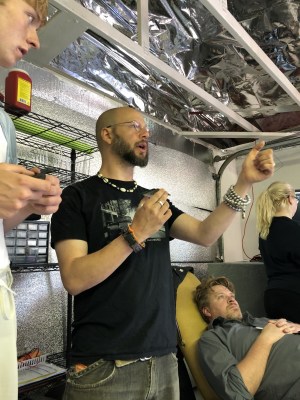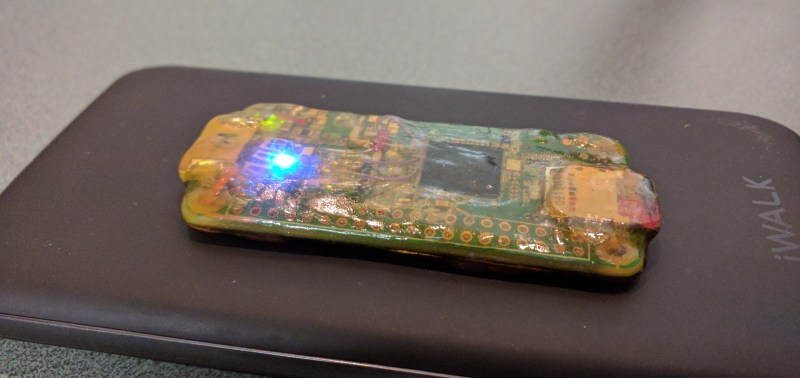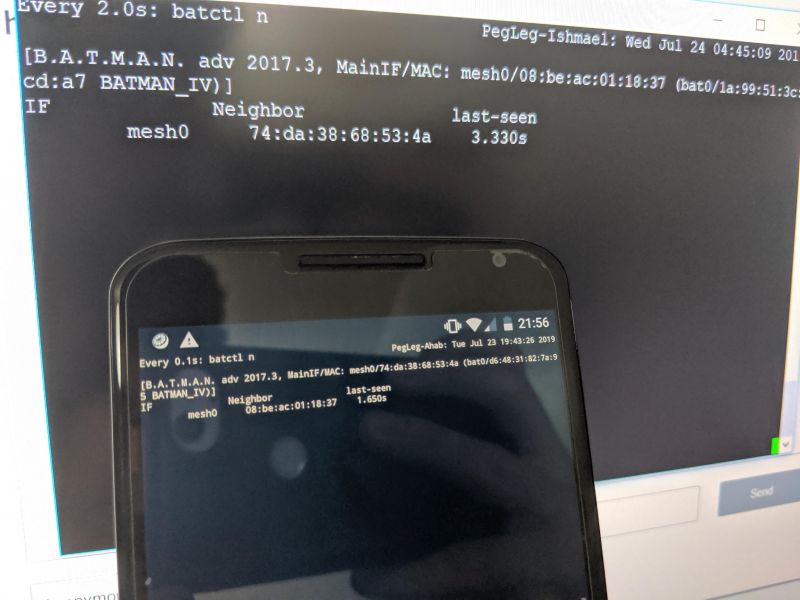Earlier this month, a group of biohackers put two Rasberry Pis on his feet. Although it sounds like bleeding, this computer is already a v2 version of a project called PegLeg. I was lucky to see both options with my own eyes. The first version was huge: a motherboard and Wi-Fi router the size of a can of Altoids. This is a reminder that the line between the avant-garde and the avant-garde is always shifting, and she really is on the edge of the avant-garde.
 How is this line moving? Sometimes it's about what smart people can do in a long week. In May, at the three-day Grindfest biohacking convention, someone said something along the lines of, “It would be great if…” Anyone who has spent an hour in a builder's room or at a hacker convention knows how these conversations go. . Instead of ending in laughter, things move quickly.
How is this line moving? Sometimes it's about what smart people can do in a long week. In May, at the three-day Grindfest biohacking convention, someone said something along the lines of, “It would be great if…” Anyone who has spent an hour in a builder's room or at a hacker convention knows how these conversations go. . Instead of ending in laughter, things move quickly.
The router discards all non-essential components. USB port: removable. Plastic boxes: recycling. Battery: Recycled. Amazon's fastest delivery brought a Qi wireless case and the smallest 64GB silicone USB flash drive to power out-of-body implants. The only recipient of PegLeg 1.0 is [Lepht Anonymous], who uses the pronoun "it". [Lepht] has a well-deserved reputation among tech implant biohackers and often uses the term "grinder" to avoid confusion with dating software or high-tech tools.
V1: Router board installation
[Mixel Laufer], [Nick Titus] and [Zach Shannon] were the best guys for a stylish deconstruction, so nothing got in the way of the gaudy cover. Everything that enters the body must be protected, otherwise there will be problems. [Cass] developed a biocompatible resin for just such an occasion, and the formula was extensively tested before it made it to Pegleg. [Cass] is a nurse from California who hosts Grindfest at her home, where she has a lab and operating room that few hacker rooms would envy.
[Nick Titus] was responsible for optimizing hardware and minimizing points of failure. God, we know when we build something and it stops working, we check our work first and every solder joint has a worker and a stress point. This due diligence (and much more) concerns implants.
Every time I made another hardware mod, I tried to test it again and the stakes went up.
- [Michael]
I took some photos of [Mixæl] holding the v1 open with both hands like a girl. I know this is a bit old and the weight will always be with me. Participants even signed the silkscreen at the urging of Lev, who reported that after ten weeks there were no problems with the implants. The actual implantation took place after Grindfest was officially over, but because of the procedure, [Left] missed his flight and the airline treated the man who had just had surgery badly.
Getting the Raspberry Pi Zero Skin

But hey, who is still using PCB routers today? The board of the day is a scaled-down Raspberry Pi Zero. At DEF CON 27, I saw and held a Pegleg v2, which boils down to a Pi0W (Raspberry Pi Zero W) with a Qi receiver, capacitors, a WiFi dongle, and half a terabyte of memory. Three of them were prepared for implementation during the conference.
The [Lepht] model sits next to the tattoo on the sleeve, but the last two go to the upper thighs [Mixæl] and [Cass], which plan the overlay depending on where the Qi battery will be placed in the pocket. your favorite pants [Cass] includes both devices, so if you consider yourself a metalhead, ask yourself if you can strap a computer to your hip.
Decentralized file sharing and other tricks of this implant

Every Pegleg runs a PirateBox distribution, so while it's running, any end user with a Wi-Fi device can connect to find anonymous chats, file servers, and videos of the installation process if the owner supports it. PirateBox is in danger of disappearing without support, so give it a try if it surprises you. A standalone server does not require Internet access, but a network is required for users to connect. Implanted memories and networks sound like science fiction, and speaking of science fiction, this biohack caught the attention of [William Gibson], who loves people carrying encrypted data. Johnny Mnemonic anyone?
If we had a mesh network, it could eventually replace the centralized internet and have everything we thought the internet would be but is now missing due to centralization. It can be easily disabled, censored, tracked... and expensive to access.
- [Michael]
Hardware wasn't the only thing that changed from version 1 to version 2. The software was changed by [Zack], who developed the Pegleg distribution and runs the mesh network. The best job description is “research, configure and test software”, but technical knowledge is sufficient.
Many of the units go through a tool shop run by [Nick], who also handles the logistics of what he refers to as a "Pack of Wet Evil Cats". Seriously, try a group of hackers who do the same thing on a regular basis. The hardware optimization is still ahead of his plans, and in his opinion, [Nick] can tell me the number of soldering (fourteen) in the second version, and if you don't need a mesh, you can. only for six
Where are we now with Computing Imps
I talked to [Nick] about the whole process. According to him, the PegLeg implantation was more a form of self-expression than a logistical necessity. He also advises anyone interested in making an implant at home to try to avoid batteries, and goes into detail about the intricacies of rechargeable batteries with questions of foam heating, expansion, and contraction before talking himself out of preaching. It is very important to understand the entire system that makes up the implant. For example, he noted the absence of some admin features that allowed anonymous users to upload files at will, but could not delete them.
There are plans for a third version and it should be the same as the postage stamps but thicker. Exploring wireless charging with metal tags and other hardware platforms is in the future. There are no Kickstarter or monetization plans, but you can find the exact recipe for free on their website. If you think PegLeg is the coolest thing in the world, they accept donations, and if you think PirateBox deserves love, they need developers to stay afloat.
On the other hand, you might think of the person who dropped his pee right on his thigh when he said, "I don't need to drink cake anymore, it will go to my thigh."
Thanks to [cyberlass] and [SmokeLegend] for the advice.


